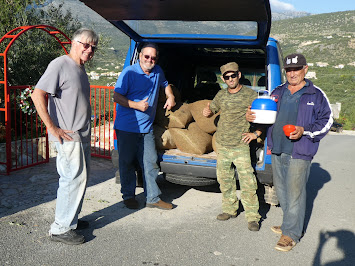My post title refers to our expat world; the world of the rural Greek Peloponnese.
It is a world where doctors still make house calls.
And because some of the questions we are most often asked by expat wannabe's, travelers heading this way, and others who are curious about life here concern health care, I thought I'd tell you a bit about it:
 |
| A house call in rural Greece |
What he wrote:
The medical facility where he works and the area he serves is about 40 minutes to our south. It is an area of The Mani that still feels remote and vast. The landscape is harsh and unforgiving; the population scant. The town of Areopoli where the facility is located is named for the ancient Greek god of war. It was the place the Greek War of Independence began in 1821. Its Health Center is renown for its service.
 |
| Landscape near Areopoli - a vast, empty land |
I'd be remiss if I didn't tell you that Dr. Mariolis was recognized last year by WONCA, the World Organization of Family Doctors, an organization of 500,000 family doctors representing some 131 countries. He was awarded the WONCA Global Five Star Doctor Award in 2021 for 'his excellence as a care provider, a decision maker, a communicator, a community leader and a manager'.
In the Matter of House Calls
 |
| Our village, Agios Nikolaos |
One of our favorite 'newbie' stories from our early days at our Stone House on the Hill stems from a visit to our Agios Nikolaos village health clinic 'to check it out'. All the staff members on duty came to greet us and during the course of introductions they told us to call before coming in, just to make sure the doctor on duty was there as it could be he/she would be out on a house call. At the time we were dumbstruck at the idea of a doctor really making house calls.
It was during that same visit we asked about how an ambulance would know where to find us should we call needing an urgent response. The receptionist asked where our home was located and after we described it, she told us not to worry: "I drive the ambulance and I know exactly where you are!"
 |
| The Stone House on the Hill |
Last year I visited our area's general practitioner, Dr. Sophia (everyone calls her by her first name). She prescribed some medicine and she told me to return the following week. She assured me there would be no charge for the second visit - the first had only been 40 euros ($43US) -- but she cautioned, "Just drop by when you can but call first to make sure I am not out on a house call."
 |
| Kalamata street scene |
A friend in the village recently had knee replacement surgery in Athens.. It was performed by an orthopedic surgeon who has an office in Kalamata, our area's metropolitan big city, an hour's drive away. In the two weeks that our friend has been home he's had a couple of house calls from his doctor who didn't want him making the trek to the doctor's office.
Humanizing Health Care
 |
| Kalamata, Greek Peloponnese |
It isn't just house calls that make 'health care' different, it is the entire system of delivery. We recently decided to have long overdue colonoscopies done by a gastroenterologist in Kalamata, who'd come highly recommended by expat friends.
We dropped by the doctor's office saying we'd like to schedule appointments (imagine dropping by to schedule something back in the US!) and was told the doctor would call us that evening to discuss them (again, imagine that!). Sure enough, at the appointed 6 pm the doctor called. The appointments were made for two weeks later - no questions about health insurance or payment.
 |
| Street scene Kalamata |
On the appointed day we appeared at the doctor's office where the procedures are performed. We were checked in together (none of that patient privacy stuff here) and as the doctor walked past he quipped in perfect English, "Who is my next victim?"
We then met with him where he explained what the procedure would involve. He had three attendants, two nurses and one anesthesiologist. Hooked to a heart monitor and given oxygen the procedure took about 20 minutes. Following a 30-minute rest, we -- again together -- met with the doctor to review the findings (photos displayed on his computer screen) as he explained what he had seen. He explained that he'd removed two polyps from each of us which would be sent to Athens for biopsies.
The cost of the procedure was 130 euros ($140US) each. The biopsies were another 50 euros ($54US) each. The procedure cost range for a colonoscopy at our Washington State Health Care provider is $1,500 - $4,500.
We received a call at 9 pm (still considered afternoon in Greece) 12 days later to tell us the results were negative. We still need to go by the office and pick up a copy of the results - as here, the patient keeps those records.
And COVID Care. . .
 |
| Winter brings light snow to the Taygetos near us |
Facebook Friends with my doctor and dentist- imagine that?!
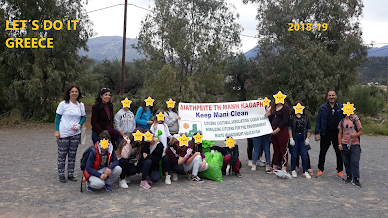 |
| Dr. Sophia participates in Clean Mani events |
Another advantage of living in a small rural area is that you can be friends with your health care professionals. Both our Dr. Sophia and our dentist, Dr. Joanna, in the village are Facebook friends of mine as they are with dozens of other patients of theirs in the village. Our Dr. Sophia is a leader in the environmental efforts here and it wouldn't be unusual to find ourselves out cleaning a beach with her.
Being FB friends does give another avenue of communication. When scheduling an appointment with Dr. Joanna she first asked for a phone number and then said, 'Oh, never mind, if I need to reach you I'll send a message on Messenger!'
How curiously refreshing to have a health care provider know us as who we are! No longer must we recite birth dates or other identifying numbers when we appear for an appointment.
Health care had been a major consideration when we made the move to Greece. And as with countries everywhere health care varies by region. We feel particularly lucky to have landed in this area - where doctors still make house calls!
 |
| Sunset from our house |
We hope this finds you well and send wishes for safe travels where ever you might be heading. We just returned from an island adventure and that will be the next topic I write about - hope you are back with us and bring a friend or two along!
Linking sometime soon with:
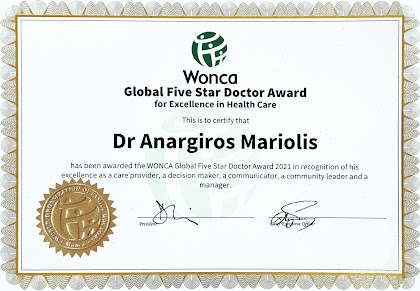





.png)







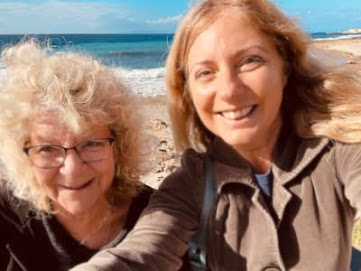
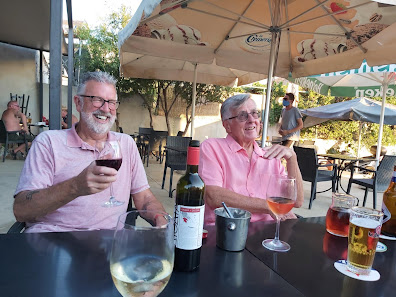
.JPG)



